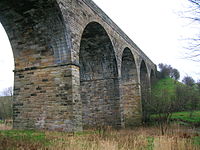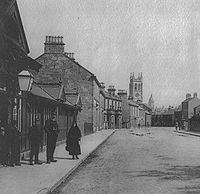Kilwinning East Railway Station
Template:Infobox UK disused station
Kilwinning East railway station was a railway station serving the town of Kilwinning, North Ayrshire, Scotland as part of the Lanarkshire and Ayrshire Railway.
Contents
History
The station opened on 3 September 1888 and was simply known as Kilwinning.<ref name="butt133">Butt, page 133</ref> It closed between 1 January 1917 and 1 February 1919 due to wartime economy,<ref name="butt133"/> and upon the grouping of the L&AR into the London, Midland and Scottish Railway in 1923, the station was renamed Kilwinning East on 2 June 1924.<ref name="butt133"/> The station closed permanently to regular passenger traffic on 4 July 1932.<ref name="butt133"/>
Today there is no trace of this station, and the site is occupied by Caley House (named after L&AR owners Caledonian Railway) and the Cornerstone Church. A large viaduct at the extreme north of the town is the only physical reminder that Kilwinning was once served by this line.
References
Notes
<references/>
Sources
- Butt, R. V. J. (1995). The Directory of Railway Stations: details every public and private passenger station, halt, platform and stopping place, past and present (1st ed.). Sparkford: Patrick Stephens Ltd. ISBN 1-8526-0508-1. OCLC 60251199.CS1 maint: ref=harv (link)
- Views of Kilwinning. 1910. Pub. Mrs. Brotherston, Kilwinning.
| Preceding Station | Historical Railways | Following Station | ||
|---|---|---|---|---|
| Stevenston Line and station closed |
style="background:#local p = {}
function p.main(frame) local args = require('Module:Arguments').getArgs(frame, {wrappers = 'Template:If empty', removeBlanks = false}) -- For backwards compatibility reasons, the first 8 parameters can be unset instead of being blank, -- even though there's really no legitimate use case for this. At some point, this will be removed. local lowestNil = math.huge for i = 8,1,-1 do if args[i] == nil then args[i] = lowestNil = i end end for k,v in ipairs(args) do if v ~= then if lowestNil < k then -- If any uses of this template depend on the behavior above, add them to a tracking category. -- This is a rather fragile, convoluted, hacky way to do it, but it ensures that this module's output won't be modified -- by it. frame:extensionTag('ref', , {group = 'TrackingCategory'}) frame:extensionTag('references', , {group = 'TrackingCategory'}) end return v end end end return p; border-left: 0px none; border-right: 0px none; border-top:1px #aaa solid; border-bottom:0px none;" | |
local p = {}
function p.main(frame) local args = require('Module:Arguments').getArgs(frame, {wrappers = 'Template:If empty', removeBlanks = false}) -- For backwards compatibility reasons, the first 8 parameters can be unset instead of being blank, -- even though there's really no legitimate use case for this. At some point, this will be removed. local lowestNil = math.huge for i = 8,1,-1 do if args[i] == nil then args[i] = lowestNil = i end end for k,v in ipairs(args) do if v ~= then if lowestNil < k then -- If any uses of this template depend on the behavior above, add them to a tracking category. -- This is a rather fragile, convoluted, hacky way to do it, but it ensures that this module's output won't be modified -- by it. frame:extensionTag('ref', , {group = 'TrackingCategory'}) frame:extensionTag('references', , {group = 'TrackingCategory'}) end return v end end end return p<div style="height:8px; background-color:#local p = {} function p.main(frame) local args = require('Module:Arguments').getArgs(frame, {wrappers = 'Template:If empty', removeBlanks = false}) -- For backwards compatibility reasons, the first 8 parameters can be unset instead of being blank, -- even though there's really no legitimate use case for this. At some point, this will be removed. local lowestNil = math.huge for i = 8,1,-1 do if args[i] == nil then args[i] = lowestNil = i end end for k,v in ipairs(args) do if v ~= then if lowestNil < k then -- If any uses of this template depend on the behavior above, add them to a tracking category. -- This is a rather fragile, convoluted, hacky way to do it, but it ensures that this module's output won't be modified -- by it. frame:extensionTag('ref', , {group = 'TrackingCategory'}) frame:extensionTag('references', , {group = 'TrackingCategory'}) end return v end end end return p; border:none; margin:0;"> |
style="background:#local p = {}
function p.main(frame) local args = require('Module:Arguments').getArgs(frame, {wrappers = 'Template:If empty', removeBlanks = false}) -- For backwards compatibility reasons, the first 8 parameters can be unset instead of being blank, -- even though there's really no legitimate use case for this. At some point, this will be removed. local lowestNil = math.huge for i = 8,1,-1 do if args[i] == nil then args[i] = lowestNil = i end end for k,v in ipairs(args) do if v ~= then if lowestNil < k then -- If any uses of this template depend on the behavior above, add them to a tracking category. -- This is a rather fragile, convoluted, hacky way to do it, but it ensures that this module's output won't be modified -- by it. frame:extensionTag('ref', , {group = 'TrackingCategory'}) frame:extensionTag('references', , {group = 'TrackingCategory'}) end return v end end end return p; border-left: 0px none; border-right: 0px none; border-top:1px #aaa solid; border-bottom:0px none;" | |
Auchenmade Line and station closed |
| Bogside Line and station closed |
style="background:#local p = {}
function p.main(frame) local args = require('Module:Arguments').getArgs(frame, {wrappers = 'Template:If empty', removeBlanks = false}) -- For backwards compatibility reasons, the first 8 parameters can be unset instead of being blank, -- even though there's really no legitimate use case for this. At some point, this will be removed. local lowestNil = math.huge for i = 8,1,-1 do if args[i] == nil then args[i] = lowestNil = i end end for k,v in ipairs(args) do if v ~= then if lowestNil < k then -- If any uses of this template depend on the behavior above, add them to a tracking category. -- This is a rather fragile, convoluted, hacky way to do it, but it ensures that this module's output won't be modified -- by it. frame:extensionTag('ref', , {group = 'TrackingCategory'}) frame:extensionTag('references', , {group = 'TrackingCategory'}) end return v end end end return p; border-left: 0px none; border-right: 0px none; border-top:0px none; border-bottom:0px none;" | |
local p = {}
function p.main(frame) local args = require('Module:Arguments').getArgs(frame, {wrappers = 'Template:If empty', removeBlanks = false}) -- For backwards compatibility reasons, the first 8 parameters can be unset instead of being blank, -- even though there's really no legitimate use case for this. At some point, this will be removed. local lowestNil = math.huge for i = 8,1,-1 do if args[i] == nil then args[i] = lowestNil = i end end for k,v in ipairs(args) do if v ~= then if lowestNil < k then -- If any uses of this template depend on the behavior above, add them to a tracking category. -- This is a rather fragile, convoluted, hacky way to do it, but it ensures that this module's output won't be modified -- by it. frame:extensionTag('ref', , {group = 'TrackingCategory'}) frame:extensionTag('references', , {group = 'TrackingCategory'}) end return v end end end return p<div style="height:8px; background-color:#local p = {} function p.main(frame) local args = require('Module:Arguments').getArgs(frame, {wrappers = 'Template:If empty', removeBlanks = false}) -- For backwards compatibility reasons, the first 8 parameters can be unset instead of being blank, -- even though there's really no legitimate use case for this. At some point, this will be removed. local lowestNil = math.huge for i = 8,1,-1 do if args[i] == nil then args[i] = lowestNil = i end end for k,v in ipairs(args) do if v ~= then if lowestNil < k then -- If any uses of this template depend on the behavior above, add them to a tracking category. -- This is a rather fragile, convoluted, hacky way to do it, but it ensures that this module's output won't be modified -- by it. frame:extensionTag('ref', , {group = 'TrackingCategory'}) frame:extensionTag('references', , {group = 'TrackingCategory'}) end return v end end end return p; border:none; margin:0;"> |
style="background:#local p = {}
function p.main(frame) local args = require('Module:Arguments').getArgs(frame, {wrappers = 'Template:If empty', removeBlanks = false}) -- For backwards compatibility reasons, the first 8 parameters can be unset instead of being blank, -- even though there's really no legitimate use case for this. At some point, this will be removed. local lowestNil = math.huge for i = 8,1,-1 do if args[i] == nil then args[i] = lowestNil = i end end for k,v in ipairs(args) do if v ~= then if lowestNil < k then -- If any uses of this template depend on the behavior above, add them to a tracking category. -- This is a rather fragile, convoluted, hacky way to do it, but it ensures that this module's output won't be modified -- by it. frame:extensionTag('ref', , {group = 'TrackingCategory'}) frame:extensionTag('references', , {group = 'TrackingCategory'}) end return v end end end return p; border-left: 0px none; border-right: 0px none; border-top:0px none; border-bottom:0px none;" | | |

